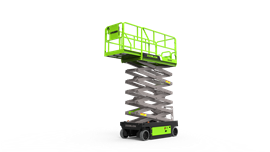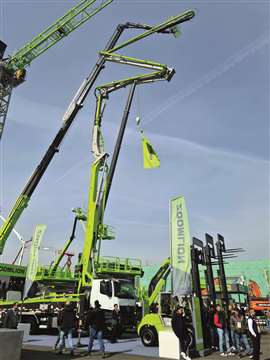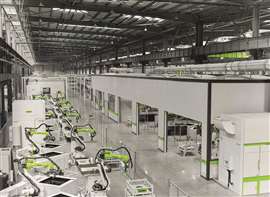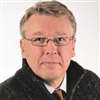Zoomlion on its battery electric technology
19 August 2024
Julian Buckley visited Chinese machine OEM Zoomlion at Intermat 2024 to find out more about their battery-electric technology.
With its headquarters in Changsha, Hunan province, Zoomlion Heavy Industry Science and Technology is a Chinese company which specialises in production of various machine types, including mobile and tower cranes, earth moving equipment and mobile elevated working platforms (MEWP), such as scissor lifts and telescopic platforms.
At Intermat 2024, held at the Parc des Expositions Villepinte, near Paris, France, the company displayed a series of its latest machines, including a selection using 100% battery power. Despite the high cost of these battery-powered machines when compared to their diesel equivalents, the company is now looking to extend the current range.
 Zoomlion ZS1212 DC electric scissor lift. (Photo: Zoomlion)
Zoomlion ZS1212 DC electric scissor lift. (Photo: Zoomlion)
Speaking with Power Progress International at Intermat, Bryan Zhang, Zoomlion’s regional director for EMEA, said the company has a keen focus on “new energy”. He continued: “Looking at the Zoomlion Group, each business unit has plans for the introduction of new energy products. That includes an electric mobile crane, concrete pumps and new MEWP solutions.”
In total, Zhang says that fully 80% of the company’s MEWP offering is now electrified. He explains that while Zoomlion was not the first to use li-ion batteries in this sector, they were the first to put the tech into mass production. Building on that, the tech now dominates company sales.
“When we first started selling electric machines, the market split was 90% normal [lead acid] batteries and 10% li-ion. Now, that split is 10% normal batteries and 90% lithium. We have been using li-ion for four or five years, they have been customer tested and they are a great solution. We have the leading technology, both in design and production.”
Zhang added that across all leading Zoomlion products, the company is now offering a battery-powered version.
Market Split
Along with battery-electric machines, Zoomlion still offers diesel variants. Asked about the market breakdown – and which customers select the electric or diesel version – Zhang says that European sales are split by region.
 Zoomlion stand at Intermat 2024. (Photo: KHL Staff)
Zoomlion stand at Intermat 2024. (Photo: KHL Staff)
“In the Benelux countries, Germany, the Scandinavian countries and in the UK, they are more open to considering electric machines; they look for machines with lithium batteries as they offer a longer operating time and good recharging times. These machines can deliver a 60% battery capacity even at -20ᵒC, so can still operate in winter.
“In southern Europe, they still tend to select the diesel products. In those countries, they are not so open [to battery-powered machines].”
Zhang explains that Zoomlion, which was founded in 1992, has been active in the European market “for a number of years”. He qualifies that by saying that the MEWP products only came to Europe in 2018. With direct sales making up about 10% of all MEWP sales, the remaining 90% are to rental companies. Zhang says that the company appreciate these rental companies having confidence in the relative newcomer.
“With the platforms, there is always someone standing on it. So safety is our first and foremost concern. Because of that safety element, it takes time for new products, new brands to be accepted in the market. We appreciate the faith our customers have put in us. When they buy from us, they are a Zoomlion customer. But they are also putting their reputation on the line when they offer Zoomlion solutions to their customers.”
It has taken the full six years, but Zhang says that the company has now made a major breakthrough in the European market and more companies are prepared to try Zoomlion’s green machines.
“We changed our company colour to green across all our products in 2015 and ’16,” he explains. “The colour is our brand identity, but it also highlights our focus on green technology!”
Second-Hand Market
Battery-power solutions for smaller machines, such as those in the MEWP market, are in many ways the ideal choice as a rental solution. With zero-emissions and very low noise, they can work in areas where diesel would not be appropriate and, in some cases, in breach of local regulations.
But inevitably, those battery machines will come to the end of their first life. What, if anything, has Zoomlion planned for this?
“As it stands, we offer a five-year warranty on our battery packs,” explains Zhang. “And we anticipate they will have an eight-year working life. Beyond that, we’re talking with our partners to support recycling of lithium batteries in Europe; they can be recycled and the materials put back into production [of new batteries].”
While li-ion is now the company battery standard, Zoomlion is looking at other battery chemistries for future models. “We’re very curious when it comes to new technologies. We sell the existing generation of products, but are always looking for new and better tech. We’re currently looking at sodium-ion batteries, the energy density is higher so uptime is extended.”
As with the battery packs, the electric motors are delivered from a supplier. But these are produced to internal specifications which support the particular application.
Following on from that, Zhang says that Zoomlion is interested in starting local machine production in Europe: “We’re looking at possible locations. Europe is very different from China, land and labour costs are higher. Manufacturing is different in China, too, we use a lot of robots.” He doesn’t have a specific timeframe for this project, but states that if the company finds the right location they will “move immediately”.
Design Specialists
Zhang says that Zoomlion has a very large team dedicated to machine designs; in MEWP, there is a team of about 300 engineers. Across all the divisions, there are about 3,000 engineers working on next-generation machine designs.
 The Zoomlion factory in Changsha features a high level of automation. (Photo: Zoomlion)
The Zoomlion factory in Changsha features a high level of automation. (Photo: Zoomlion)
As noted, batteries and motors are delivered from suppliers, but Zoomlion produces many of the structural parts used to produce the machine chassis, while hydraulics are also designed and produced in-house. Control systems are developed together with a partner company; this includes telematics and other digital solutions to support such features as predictive maintenance.
“If a machine has repeat problems in the same component, we will know. From that data we can make the necessary change,” he explains. This information would flow upstream to the assembly line so the necessary change can be made.
There have been reports in the past about suppliers in China which will initially deliver high-quality components, but then that quality can decline as the supplier looks for routes to increasing their margin.
“We don’t have much problem with our supply chain as we’ve a very good quality control team,” explains Zhang. “We also rate our suppliers and based on those results we will decide whether to continue working with them. We can’t afford to have parts delivered from suppliers to affect our reputation – and the reputation of our customers.”
Asked if companies in China or Europe offer the best machines, Zhang has this to say: “We know some European manufacturers have really good machining and fabrication technology. I cannot speak for the whole of China, but at Zoomlion we have a focus on new technologies, digitalisation and our green energy products.”




